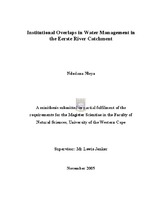Institutional overlaps in water management in the Eerste River catchment
Abstract
In this minithesis I have investigated overlapping mandates as a source of management failure in water management in South Africa in general and Eerste River Catchment in particular. I analysed major legislation which deals with water management to find out how duties and responsibilities are apportioned in the various pieces of legislation. I also undertook an exercise of evaluating roles and responsibilities played by various organs of state in water management from national government, Provincial Government of the Western Cape through to local government, in this case the Municipality of Stellenbosch and the City of Cape Town. It emerged that there were a number of areas of overlap, ambiguously defined mandates, conflict and that these were impeding on decision making in water management. In order to test the framework built above, I then applied it in the Plankenbrug River, a tributary of the Eerste River. Through analysis of newspaper clippings over a period of 4 years I was able to reconstruct conflict over ill-defined mandates in the various aspects of the management of the catchment which showed that there were differences in roles of the different state organs operating in the catchment. Water management conflict emanated from lack of congruence in the various legislation and differences in the interpretation of legislation. The various state organs seem to be aware of the constitutional duty of cooperative government that engenders state organs to work co-operatively in order to meet their developmental mandates. It seems however that the state organs were merely interested to be seen to be in conformity with this duty more than actually solving the issue as this was seen as something to be tackled at a higher level.

